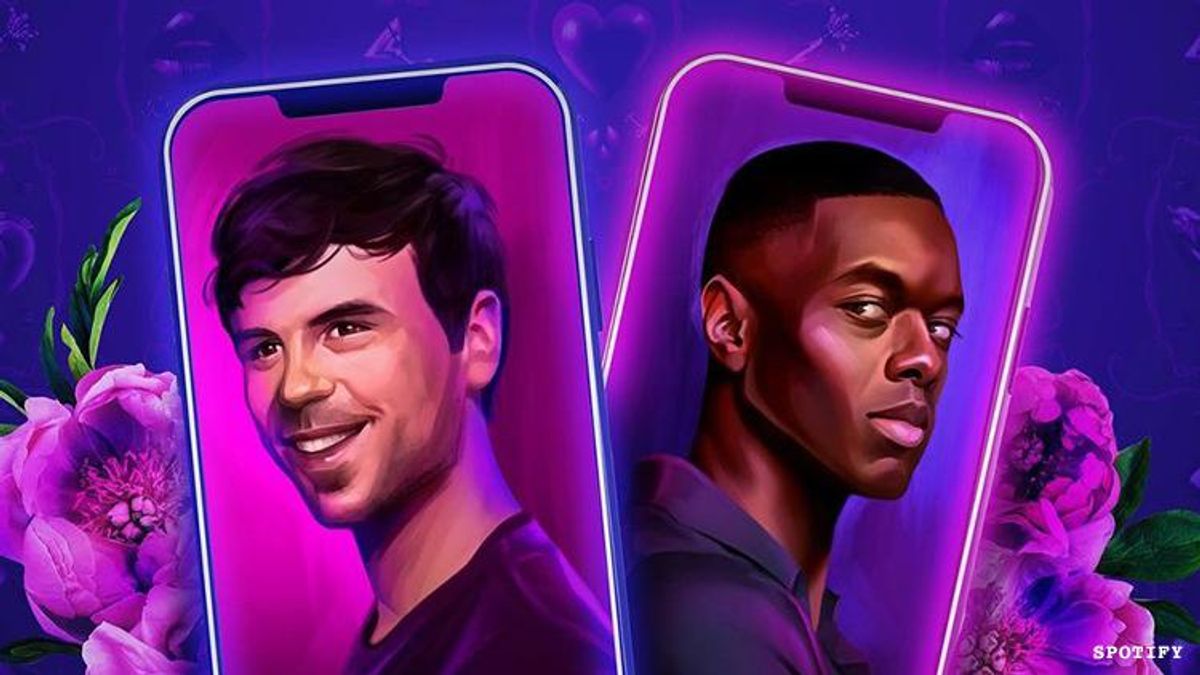There's a long tradition -- "a truth universally acknowledged," you might say -- that the world of Jane Austen will be reimagined as a trendy new film or series every few years or so. With the success of related shows like Bridgerton and the rise of gay romantic comedies, it feels like the right moment for Pride & Prejudice, the grandmother of all rom-coms, to get a fresh update for LGBTQ+ audiences.
That's just what we're getting with Gay Pride & Prejudice, a new Spotify Original scripted podcast. Executive produced by Jesse Tyler Ferguson, Justin Mikita, and Gimlet's head of scripted Mimi O'Donnell, the 10-episode series was written and directed by Zackary Grady and features a standout cast including Ferguson, Blake Lee, Rosie O'Donnell, Ronald Peet, Vella Lovell, Javier Munoz, Sherry Cola, and more.
The first two episodes are now available on Spotify, and the series will be presented at this year's Tribeca Film Festival with a panel featuring the cast and creators on June 13.
"The idea for the series came the day marriage equality passed," Grady told The Advocate. "I remember joking on that day, 'Oh, we can do Pride & Prejudice now because of the marriage backdrop!'"
It's always been easy for him to relate to Austen's novels, he said. "When you first encounter Austen, you expect it to be dusty and you expect it to be boring. I think everyone's so struck by how much fun it is. It's people going to parties and essentially hooking up with each other, in the Regency era. It's a universal feeling."
In this modern retelling, "the Bennet sisters" are a circle of best friends in Boston's LGBTQ+ community, with Blake Lee's Bennet in the central "Lizzy" role and Rosie O'Donnell's lovably neurotic Mrs. B as the mother figure. The first episode sees Bennet trying to gather everyone at Mrs. B's house after her wife's funeral; but the news of Obergefell v. Hodges passing and the unexpected arrival of gay celebrity Carlos Bingley (Munoz) draws them to a local nightclub, where Bennet meets Bingley's snobbish friend Darcy Williams (Peet), a newly out NFL star.
"In the beginning, [Bennet] is so focused on his chosen family and keeping them all together, and they're all evolving and growing up," Lee said. "It's that time in your early 30s when some of your friends are getting married and some of your friends are having kids, and [he's] the single person whose chosen family is everything, it's his whole world."
Setting this story in Boston, with the gay hubs of New York and Provincetown nearby, was a careful choice on Grady's part. "There is such a difference between New York and L.A. from other cities around the country. The queer pockets are more niche in those cities," he said, pointing out the parallels between London society and the Bennets' country village in the novel. "I love gay bars in smaller cities or small towns because I actually find them more welcoming sometimes than you do in New York City gay bars."
Beyond the obvious Pride and prejudice of it all, the themes of Austen's work intersect with modern gay culture in ways that can be both thoughtful and funny. Bookish, preachy Bennet sister Mary (Sherry Cola), for instance, is easy to picture as an outspoken lesbian activist caught up in the politics of marriage equality.
"I think Mary CC'd herself on this email and got involved, and she's very intertwined in the happenings of what's going on," Sherry laughed. "You know how there's the friend [who's] a lot to be around, and not necessarily welcome? But people appreciate it. People appreciate the harsh truths, people appreciate the tough love, and that's exactly what Mary is."
Ronald Peet's Darcy is sure to draw a strong reaction when he snubs Bennet for being "too femme," a giant red flag for anyone who's used gay dating apps.
"In spaces like Grindr or Scruff, it's been publicized at least that there are people who lead with 'what I don't want,' and we know that that's just projection from insecurity," Peet told The Advocate. "We do go deeper than that with Darcy, and we see the ways in which he's been hurt, not necessarily by effeminate men, but hurt by being vulnerable and being open to love."
Rather than study previous versions of Darcy as the romantic hero, Peet drew on recent headlines about gay professional athletes and Black public figures like comedian Jerrod Carmichael to explore why Darcy might be so closed off at the beginning of the series.
"Darcy is dealing with not only being in the NFL where everyone is performing a certain type of maleness, but also a Black American who's performing a different kind of something, and then a queer man who's performing a different kind of something, all at the same time, and trying to navigate and stay a step ahead of other people's projections onto him, which leads him to being a brick wall."
It will be a challenge for Bennet to get past that first impression, Lee said. "I almost think that's the worst thing he could have heard in that moment. Being queer and being out and being proud, and being surrounded by his queer best friends, is everything to him."
But just like in the novel, he has his own biases to unpack before their relationship can move forward. "What Bennet does is he sees Darcy, and he projects his own opinion on who he is. There's so many references like, 'Rich people don't want to talk to people like us.' It's almost a protective thing, what he's doing. He's basically saying that so if they don't [talk to him], he's like 'Yeah, I already went through that, I already dealt with that.'"
Grady told The Advocate that working with Lee, Peet, O'Donnell, Cola and the rest of the cast on this project was a dream come true. "I told them all, 'Don't worry about carrying the weight of these iconic characters. Just treat them as new people. They're yours.' We were so blessed with actors who showed up and just knew what to do."
On a more somber note, with the Supreme Court poised to overturn Roe v. Wade this summer and raising fears that Obergefell v. Hodges could be next, he hoped the series will serve as a "reminder of that moment, how recent it was but how long ago it feels," he said.
"The thought of any legislation we have now being taken away, of any kind, we need to remember that it affects actual people in their day to day lives."


















































































